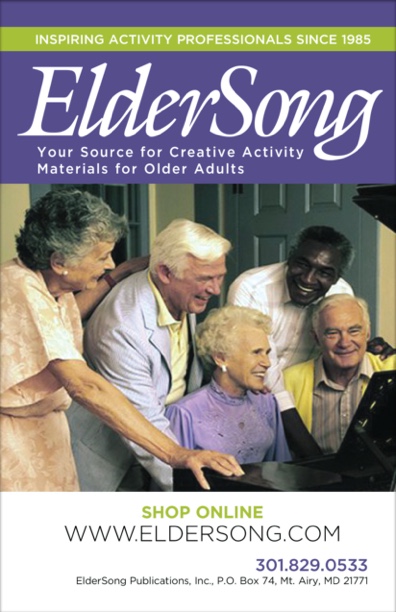The year is 1932. America is in the throes of the Great Depression. Bank failures, farm and home foreclosures, and a host of unemployed people blanket much of the country. Citizens are looking for a new leader to deal with the economic crisis. They turn to the Democratic candidate, the governor of New York, who promises a “New Deal” for Americans. In November, Franklin Delano Roosevelt is elected the 32nd president of the United States, defeating Herbert Hoover in a landslide victory. Twelve years of history are in the making. This month’s posting focuses on the theme of “FDR and His Times.”
Sing FDR’s 1932 campaign song, “Happy Days Are Here Again,” with your group. Was this an appropriate song for Roosevelt to use, given the times?
From the beginning of his administration, FDR sought to calm fears about the Great Depression. In his First Inaugural Address in 1933, FDR reassured Americans that they had “nothing to fear but fear itself.” The only president to be elected to four terms in office, Franklin Roosevelt had a profound impact on the lives of adults who are now over 75. Ask your group to share any recollections they have of FDR’s evening radio talks. Listen to audio clips from his Fireside Chats. Talk about FDR’s special gift of communication and his calming influence on the public. Ask: How did FDR use the medium of radio to restore confidence in government?
To help participants recall the times, pass around some conversation pieces from the 1930s and early 1940s: historic photographs of Franklin and Eleanor Roosevelt, pictures from the Baseball Hall of Fame in Cooperstown, postcard of the Hoover Dam, Shirley Temple doll, pictures of classic vintage radios, Life magazine, The Saturday Evening Post (with Norman Rockwell illustrations), Superman comic, Rosie the Riveter poster, Parker Brothers’ Monopoly game, Gone with the Wind, V-mail, Popeye comic strips, ration stamps, Nancy Drew and the Hardy Boys books, Depression glass. Ask group members to share a memory or two associated with one of the items. Or, read headlines from the times, 1933-1945, and ask participants to share any recollections they have of the person, place, or event. Here’s a sample:
- 1933: Prohibition repealed
- 1934: Dust Bowl begins on Great Plains
- 1935: Babe Ruth retires from baseball
- 1936: Jesse Owens wins four gold medals in summer Olympics
- 1937: Amelia Earhart lost at sea
- 1938: Orson Welles broadcasts The War of the Worlds
- 1939: New York World’s Fair opens
- 1940: Congress passes the Selective Service Act
- 1941: Pearl Harbor is bombed
- 1942: Sugar, coffee, gas rationed
- 1943: Eisenhower becomes supreme commander of Allied forces
- 1944: FDR signs GI Bill of Rights
- 1945: FDR dies on April 12
Franklin Roosevelt guided America through domestic and foreign crises. As a result of his leadership during the Great Depression and WWII, Roosevelt had a unique relationship with the American people, who appreciated his optimism, confidence, political savvy, and respect for the common man. Ask your group to list qualities of effective leadership. Discuss FDR’s leadership during a tumultuous period in American history. Ask: How did FDR change life in America? Highlight the bank and stock market reforms and “Alphabet agencies” which were created through the New Deal (e.g., Public Works Administration, Tennessee Valley Authority, Farm Credit Administration). Discuss some of the lasting legacies of his programs, e.g., Social Security, unemployment compensation, federally insured banks, minimum wage and overtime pay, and labor unions /collective bargaining. Ask: How did FDR alter America’s role in the world? Pass around old World War II posters from 1941-1945 and review the messages of the posters. Veterans can also provide insight into America’s foreign policy. Invite a history teacher to talk about the formation of the United Nations.
Many Americans admired the president’s strength of character. Ask: What did you learn from your parents about surviving hard times (e.g., stretching the budget)? What did you learn about resilience and resourcefulness as you faced the Depression and a world war? FDR once stated: “When you get to the end of your rope, tie a knot and hang on.” Encourage your group members to share some experiences in which persistence paid off in their lives.
As an overview of FDR, look at his four presidential campaigns: 1932 against Herbert Hoover; 1936 against Alf Landon; 1944 against Wendell Wilkie; and 1944 against Thomas Dewey. Excerpts from many of FDR’s well-known speeches provide insight into his philosophy of government. Chat with your group about how the role of government changed during FDR’s administration. The film considers both domestic and foreign affairs, including FDR’s reluctance to involve the U.S. in World War II.
Despite the hard times in the 1930s, Americans enjoyed many forms of inexpensive entertainment. Radio shows were big hits! Ask your group what they remember about the Golden Age of Radio. What were some of their favorite shows? The family would often gather around the radio each night to hear favorite programs, including music. Big Bands and swing music flourished.
Serve your group a dessert selected from Irma Rombauer’s The Joy of Cooking, published in 1936.
Not only was there music on the airwaves but also in dance halls. The jitterbug was a popular dance. Invite some dancers (in vintage clothing) to demonstrate the various types of swing dancing, including the jitterbug. Sing or hum some favorite songs of the 1930s and early 1940s. Examples:
- “Forty-Second Street”
- “Easter Parade”
- “We’re in the Money”
- “Blue Moon”
- “Pennies from Heaven”
- “God Bless America”
- “Over the Rainbow”
- “You Are My Sunshine”
- “Chattanooga Choo Choo”
Reminisce about other diversions, including going to the movies, playing board games, listening to the Yankees, and reading mystery novels.
Be sure to end your sessions on a light note. Listen to an old-time radio comedy show of the 1930s, like The Jack Benny Show. What were some of the comedian’s favorite sayings and mannerisms? Or, show the 1938 comedy classic, You Can’t Take It with You, starring Jean Arthur, Jimmy Stewart, and Lionel Barrymore.
Franklin Roosevelt was voted one of the most influential people in the last 100 years by Time Magazine in December 1999 (Time 100: People of the Century). He was a runner-up for the Person of the Century. The Roosevelts dominated American politics for 12 years. Talk about FDR’s presidential legacy. Define legacy. What factors affect a president’s legacy? How do historians evaluate a past president? Did FDR leave a strong presidential legacy?
America honors its past presidents in many ways. Show a picture of the Franklin Delano Roosevelt Memorial, located near the National Mall in Washington, D.C. Have any of your participants visited the memorial? Have any toured the Franklin Delano Roosevelt Presidential Library and Museum in Hyde Park, NY? Challenge your history buffs to a quiz on the 32nd president.
FDR QUIZ
- With what disease was FDR stricken in 1921? Polio
- In 1928, FDR was elected governor of which state? New York
- Whom did FDR defeat in the 1932 presidential election? Herbert Hoover
- Who opposed FDR in the presidential election in 1940? Wendell Wilkie
- What hobby did FDR maintain throughout his life? Stamp collecting
- Where was FDR born? Hyde Park, New York
- In 1936, FDR dedicated which U.S. dam (now known as the Hoover Dam)? Boulder
- Where was FDR’s “little White House” located? Warm Springs, Georgia
- Who served as FDR’s last vice-president in 1945? Harry Truman
- FDR appointed the first woman Cabinet member. What was her name? Frances Perkins (Secretary of Labor)
- What was the name of Eleanor Roosevelt’s syndicated newspaper column, which ran from 1935-1962? “My Day”
- What was the name of FDR’s Scottish terrier? Fala
- In 1941, FDR’s State of the Union Address spelled out “Four Freedoms” to which all people are entitled. What are they? Freedom of Speech, Freedom of Worship, Freedom from Want, and from Freedom from Fear
- What was the name of FDR’s fund-raising campaign in the fight against polio? March of Dimes
- How was Franklin Roosevelt related to Teddy Roosevelt? Distant cousin
THOUGHT FOR THE MONTH
Have you had a few frustrating days at work lately? Eleanor Roosevelt had this insight:
“With the new day comes new strength and new thoughts.” ~ Eleanor Roosevelt
“FDR AND HIS TIMES” written by Sue Hansen. © 2005 ElderSong Publications, Inc. All rights reserved.
Reprint Policy: To reprint or republish all or portions of this entry, you must acquire written permission and agree to link back to the original source. Please contact us at [email protected] to obtain permission.


